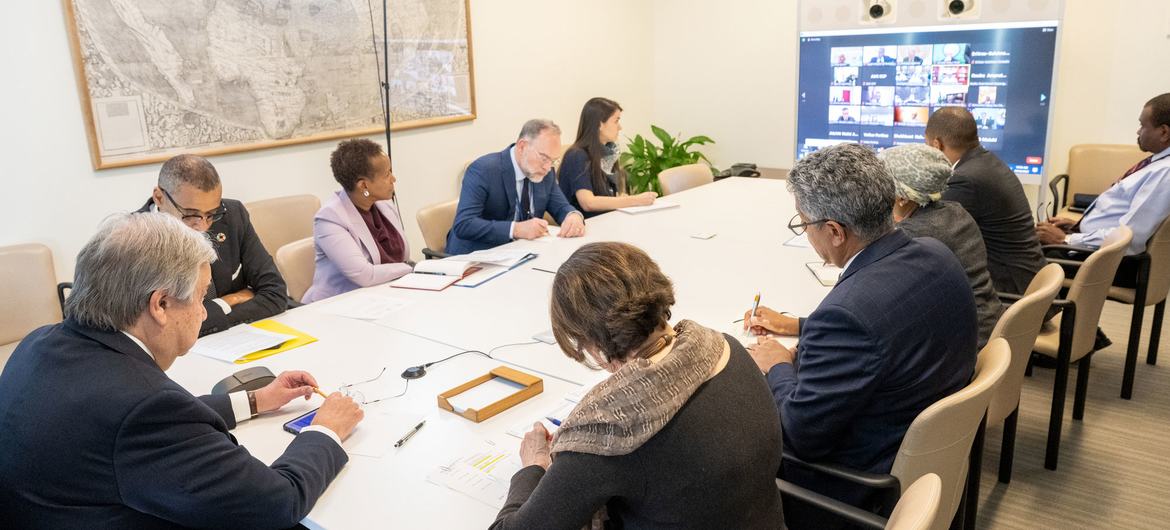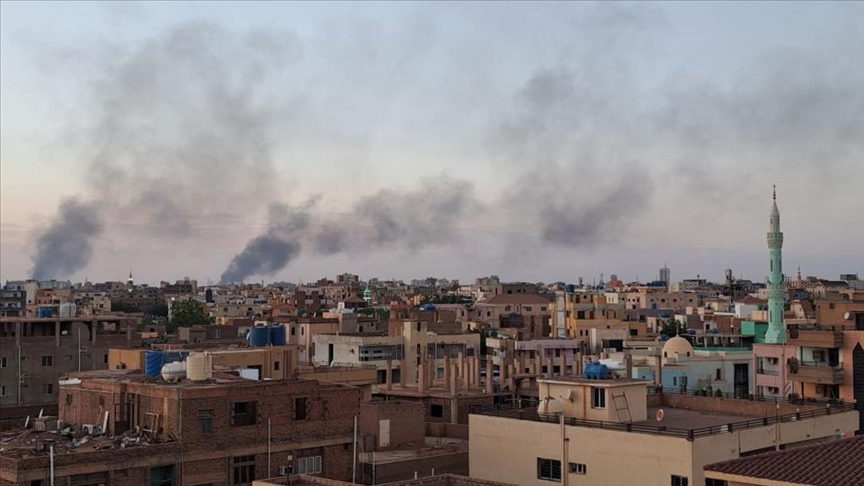As fighting continues to rage in Sudan’s capital Khartoum after a 24-hour-ceasefire failed to hold, African and world leaders warned of the real danger that the escalating crisis in Sudan could spill over to the wider region and degenerate into a security and humanitarian crisis on a disastrous scale.
UN Secretary-General António Guterres on Thursday appealed for warring parties in Sudan to observe a ceasefire for at least three days so that civilians trapped in conflict zones can seek medical treatment, food, and other essential supplies. His call to silence the guns during the Eid al-Fitr celebrations, starting in Sudan Friday at the end of Ramadan, followed a virtual meeting on the crisis, convened by the African Union (AU).
The AU meeting brought together the UN, the League of Arab States, the East African bloc regional bloc “the Intergovernmental Authority on Development in efforts for peace” (IGAD), the European Union, and countries committed to bringing an end to the hostilities in Sudan, where rival military factions have been battling for power for nearly a week.
The ceasefire “must be the first step in providing respite from the fighting and paving the way for a permanent ceasefire,” the UN Secretary General said, briefing journalists at UN Headquarters in New York.
Hundreds have been killed in the clashes between the Sudanese armed forces and the paramilitary group, the Rapid Support Forces (RSF), who are at odds over the return to civilian rule.
Humanitarians have also been hampered from carrying out their lifesaving operations, due to attacks and looting.
Guterres said the cessation of hostilities must be followed by serious dialogue, allowing for the successful transition, starting with the appointment of a civilian government.
He condemned the targeting of humanitarian workers and assets, and reminded the parties of their international obligations, including to ensure the safety and security of aid workers.
Most of the fighting has occurred in the capital, Khartoum, where residents have been trapped in their homes for days.
Thousands have fled the city, though evacuation has become increasingly difficult. Humanitarians warn that people are running out of food, fuel, and other vital supplies, and many urgently need medical care.
“The situation in Sudan is increasingly concerning and heart breaking. Over 330 people have died so far, and nearly 3,200 are injured,” the Director-General of the World Health Organization (WHO), Tedros Adhanom Ghebreyesus, wrote in a statement posted on his official Twitter account.
Tedros condemned all loss of life, especially attacks on civilians and healthcare. He expressed deep concern over reports of forces occupying health facilities, underlining that attacks on healthcare are a flagrant violation of international law.
“The lack of safe access, of electricity, food, water, personnel and the diminishing medical supplies are making it nearly impossible for many health facilities to function at the exact time when there are thousands injured in need of urgent care,” he said.
The head of the UN Children’s Fund (UNICEF) also called on the parties to respect their international obligations to protect boys and girls from harm and to ensure humanitarians can quickly reach children in need.
“Five days of intense hostilities in Sudan, and four failed ceasefires, have already taken a devastating toll on the country’s children,” UNICEF Director Catherine Russell said in a statement. “If the violence does not stop, this toll will only increase.”
She said at least nine children have reportedly been killed, and more than 50 reportedly injured as hostilities continue in Khartoum, the Darfur states and North Kordofan, though insecurity makes it difficult to collect and verify information.
Humanitarian needs in Sudan were already at record levels at the start of the year, according to UN relief agency, OCHA, with nearly one third of the population, almost 16 million people, requiring assistance.
UNICEF Chief said the crisis has disrupted critical-life saving care for an estimated 50,000 children suffering from acute malnutrition, who need ongoing round-the-clock care.
“The fighting also puts at risk the cold chain in Sudan, including over $40 million worth of vaccines and insulin, due to the breaks in the power supply and the inability to restock generators with fuel,” she added.
Meanwhile, the World Food Program (WFP) warned that the violence could push millions more into hunger.
WFP had planned to support some 7.6 million people in Sudan this year but was forced to temporarily halt operations as the fighting is preventing teams from carrying out activities such as delivering critical emergency food, providing school meals, and preventing and treating malnutrition.
The UN agency has also suffered immense losses as three staff members were killed in crossfire last Saturday, and two sustained severe injuries. WFP added that its staff, offices, vehicles, equipment, and food stocks have also come in the direct line of fire.
The UN Humanitarian Air Service (UNHAS), which WFP manages on behalf of the international community, is now completely grounded. One aircraft in Khartoum has been damaged beyond repair, and at least 10 vehicles and six food trucks have been stolen.
Additionally, WFP guesthouses, offices and warehouses in Nyala, South Darfur, have been overrun and looted, resulting in the loss of up to 4,000 metric tons of food.
Meanwhile, the UN reproductive health agency, UNFPA, warned that Sudan’s health system is at near collapse, and expressed concern about pregnant women who require ongoing care and access to hospitals where they can safely give birth.



